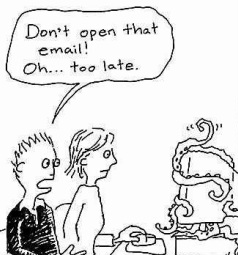Computer Viruses

A computer virus is a computer program that can copy itself and infect a computer. The term "virus" is also commonly but erroneously used to refer to other types of malware, including but not limited to adware and spyware programs that do not have the reproductive ability. A true virus can spread from one computer to another (in some form of executable code) when its host is taken to the target computer; for instance because a user sent it over a network or the Internet, or carried it on a removable medium such as a floppy disk, CD,DVD, or USB drive.
Viruses can increase their chances of spreading to other computers by infecting files on a network file system or a file system that is accessed by another computer.
As stated above, the term "computer virus" is sometimes used as a catch-all phrase to include all types of malware, even those that do not have the reproductive ability. Malware includes computer viruses, computer worms, Trojan horses, most rootkits, spyware, dishonest adware and other malicious and unwanted software, including true viruses. Viruses are sometimes confused with worms and Trojan horses, which are technically different. A worm can exploit security vulnerabilities to spread itself automatically to other computers through networks, while a Trojan horse is a program that appears harmless but hides malicious functions. Worms and Trojan horses, like viruses, may harm a computer system's data or performance. Some viruses and other malware have symptoms noticeable to the computer user, but many are surreptitious or simply do nothing to call attention to themselves. Some viruses do nothing beyond reproducing themselves.
How to Stop Computer Viruses
1. If you are connected to the internet, you must use a firewall. Windows comes with a stanard firewall included. You just need to turn it on! Other free firewalls are available. Use Google or Download.com and search for them.
2. You should visit Microsoft Update to make sure that your computer and its software have the latest bug fixes. A hacker can use a virus to exploit a hole in your software to steal your data or take control of your computer.
3. Use anti-virus software and keep it up to date! Norton and McAfee are the two most popular, but just as with firewalls, there are many free and effective alternatives.
4. This one is an oldy, but a goody. Do not open email attachments from people you don't know. Also, do not open attachments from people that you do know, but aren't expecting. Even friends sometime pass along viruses!
Viruses can increase their chances of spreading to other computers by infecting files on a network file system or a file system that is accessed by another computer.
As stated above, the term "computer virus" is sometimes used as a catch-all phrase to include all types of malware, even those that do not have the reproductive ability. Malware includes computer viruses, computer worms, Trojan horses, most rootkits, spyware, dishonest adware and other malicious and unwanted software, including true viruses. Viruses are sometimes confused with worms and Trojan horses, which are technically different. A worm can exploit security vulnerabilities to spread itself automatically to other computers through networks, while a Trojan horse is a program that appears harmless but hides malicious functions. Worms and Trojan horses, like viruses, may harm a computer system's data or performance. Some viruses and other malware have symptoms noticeable to the computer user, but many are surreptitious or simply do nothing to call attention to themselves. Some viruses do nothing beyond reproducing themselves.
How to Stop Computer Viruses
1. If you are connected to the internet, you must use a firewall. Windows comes with a stanard firewall included. You just need to turn it on! Other free firewalls are available. Use Google or Download.com and search for them.
2. You should visit Microsoft Update to make sure that your computer and its software have the latest bug fixes. A hacker can use a virus to exploit a hole in your software to steal your data or take control of your computer.
3. Use anti-virus software and keep it up to date! Norton and McAfee are the two most popular, but just as with firewalls, there are many free and effective alternatives.
4. This one is an oldy, but a goody. Do not open email attachments from people you don't know. Also, do not open attachments from people that you do know, but aren't expecting. Even friends sometime pass along viruses!
